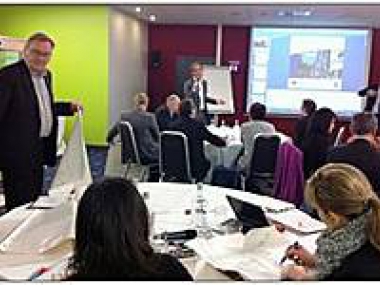URBACT Capacity Building: Promoting New Ways of Thinking
Edited on
09 October 2017The overall success of URBACT will in large part be determined by its ability to disseminate its messages to urban practitioners throughout Europe and create a community which shares new ways of thinking when it comes to solving the problems facing the cities of today. But there is no single means of communication or single type of practitioner who should be included in the community...

The community includes local and national government employees, elected representatives, NGOs, professional planners, private sector developers and many others. And the messages must be delivered through a variety of means including international forums, in-country events, and the work being carried out by URBACT Local Support Groups (LSG) according to URBACT director Emmanuel Moulin and Project and Capitalisation Manager Melody Houk.
"We want to improve the capacity of local practitioners and decision makers who are responsible for action planning in their cities", says Emmanuel Moulin. "But it's not just about using new tools; it's about new ways of thinking and understanding the importance of working with key stakeholders to find answers to problems in their cities."
He hopes that the LSGs in cities throughout Europe will help spread this message. "There are 150 cities participating currently in URBACT and we hope that the activities of the LSGs will have a snowball effect and bring more people and cities in."
Cumulative effect
Melody Houk agrees."“We are hoping that URBACT events have a cumulative effect. If two or three people from a city attend an event they can reach five or seven more people who weren’t at the event. This will be very important for disseminating and embedding the learning which we are creating in URBACT. We want to provide the tools and methods to enable stakeholder engagement and assist with the development of better policies. Building a community of practitioners with a shared approach to designing urban policies will be very important in this regard."
The point made by both Melody Houk and Emmanuel Moulin is that URBACT is not about a theoretical approach to urban policy formation but has its roots firmly in practicality. "It's about sharing experiences to develop more efficient ways to design policies. We are also trying to change mindsets", says Melody Houk. "While one issue might not be a major challenge for a city in a particular region it might be much bigger for other cities. But these cities can still learn from each other. The approach to solving an issue in one city may prove very useful in solving a different problem in another."
URBACT training for elected representatives reflects this practical approach. "When we asked URBACT participant cities if they would be interested in training for their elected public representatives more than 70 people said they would like to be involved. This training would involve a total of nine days in three sessions during a year so this is quite a commitment. We selected 35 people to take part in the pilot training programme and it was a big success. The training was very much based on what was going on in the participants’ cities and this was very important."
An ever evolving project
And it is not only elected representatives who are receiving URBACT training. In-country training is a key aspect of the effort to spread the URBACT message. "URBACT is an ever evolving project", Melody Houk explains. "And we have started to do national seminars. We did 15 of these this year in the national languages of the participants. This is important as the main barrier can be language when you are dealing with issues at a pan-European level. Because we want to create a community of practice and learning we need to recruit the trainers who can teach the urban practitioners in their home countries."
"These training schemes will allow us to reach more people in their home cities and embed the URBACT method more deeply in those cities", Emmanuel Moulin adds.
The nature of this training and learning is very significant. "We don't want to teach people how to use a Problem Tree to address an issue – any consultant can do that", he continues. "It's a question of how to use particular tools to address urban challenges. We are building a community of experts in the URBACT Method who can deliver training at a local level in different countries."
While training at the local level is certainly important Melody Houk believes the transnational dimension is key to the overall success of URBACT. "People have their own way of thinking and working but when they meet people from other cities who do things differently it leads them to question themselves and gives them the opportunity to reflect on their own way of working. I am always being asked what cities like London and Barcelona have to learn from URBACT. One thing they learn is how to work with different cities and that is useful as it leads to further learning. It is always interesting to discuss with big German cities which are good at urban participative planning how they learned a lot from Romanian and Hungarian partners which do not share the same problems."
Read more:
- URBACT Training for Elected Representatives - website
- National Trainings on Participative Action Planning - website
Submitted by admin on
